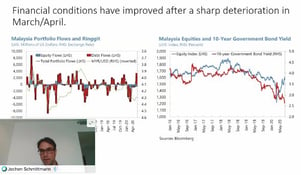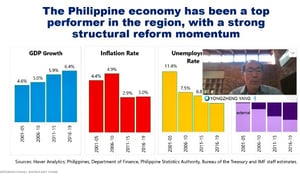News
Policies Need to be Flexible, Creative to Speed up Pandemic Recovery, Say IMF Reps in Asia
July 30, 2020, Tokyo, Japan – Speaking at a public webinar hosted by the IMF regional office in Tokyo today, IMF resident representatives for Malaysia, Philippines and Singapore said that the outlook of Asian economies hit hard by the COVID-19 pandemic remains uncertain and suggested that policymakers be creative to support economic recovery with flexible measures.
 Jochen Schmittmann, head of the resident office for Malaysia and Singapore, said that both countries were severely hit by the pandemic shock. Singapore is going through “its worst severe downturn since Independence” in 1965. He said that construction and customer-facing services, including tourism and retail sales, were most affected. The unemployment rate increased significantly in the second quarter. He commended Singapore’s swift policy response with substantive monetary and fiscal measures to support the economy and people’s livelihoods. He concluded that investment in innovation including fintech and upskilling of the workforce could help the country to emerge stronger from the crisis.
Jochen Schmittmann, head of the resident office for Malaysia and Singapore, said that both countries were severely hit by the pandemic shock. Singapore is going through “its worst severe downturn since Independence” in 1965. He said that construction and customer-facing services, including tourism and retail sales, were most affected. The unemployment rate increased significantly in the second quarter. He commended Singapore’s swift policy response with substantive monetary and fiscal measures to support the economy and people’s livelihoods. He concluded that investment in innovation including fintech and upskilling of the workforce could help the country to emerge stronger from the crisis.
On Malaysia, Schmittmann noted that the government’s movement control order had been effective in containing the spread of COVID-19. Nonetheless, the pandemic shock hit the economy hard, prompting the government to take robust measures amounting to 20.4% of GDP, he said. The recovery so far is uneven by sector, unemployment has risen sharply, and inflation remains low, he added. “We don’t know how the pandemic will play out in coming months, but COVID-19 could accelerate digitalization, innovation and adoption of new technology,” he said. “Malaysia is well positioned for that.”
 Meanwhile, Yongzheng Yang, resident representative to the Philippines, said the pandemic had a severe impact on the Philippine’s economy, which had been “a top performer in the region with a strong structural reform momentum”. He expected a sharp GDP contraction in 2020 before a rebound in 2021, as the Philippines continues its effort to flatten the infection curve. The government responded to the crisis with timely easing of monetary and fiscal policies and targeted assistance to affected households and businesses, especially micro, small and medium enterprises. He stressed the need to mitigate scarring effects, such as loss of workers’ skills and increased bankruptcies, through various measures including strengthening social protection programs and increasing support for small businesses.
Meanwhile, Yongzheng Yang, resident representative to the Philippines, said the pandemic had a severe impact on the Philippine’s economy, which had been “a top performer in the region with a strong structural reform momentum”. He expected a sharp GDP contraction in 2020 before a rebound in 2021, as the Philippines continues its effort to flatten the infection curve. The government responded to the crisis with timely easing of monetary and fiscal policies and targeted assistance to affected households and businesses, especially micro, small and medium enterprises. He stressed the need to mitigate scarring effects, such as loss of workers’ skills and increased bankruptcies, through various measures including strengthening social protection programs and increasing support for small businesses.
The online seminar was the first of a new series, Asia-Pacific Regional Webinar, hosted by the IMF Regional Office for Asia and the Pacific (OAP) to share insights of IMF staff with a regional audience. More than 400 people participated in the webinar from 18 countries within and beyond the region.
During the Q&A session, many participants posed questions for further discussion, and one of the key concerns among them was how macroeconomic policies can effectively deal with the prolonged effects of the pandemic, given the limited resources that many countries face. Responding to the concern, Yang said that the policy interventions should focus on saving lives and protecting livelihoods. “Policymakers need to be very creative,” he emphasized, echoing Schmittmann’s view on the importance of being flexible to address the most pressing issues along the recovery process. “It’s a delicate balance: how much you spend now and how much fiscal space you reserve for the future. There is no one-size-fits-all solution for all countries, so every country has to work through fiscal space, liquidity situation and long-term development goals.”
Speakers' bios
Jochen Schmittmann is the head of the IMF’s Resident Representative Office in Singapore covering Asian financial markets as well as Malaysia and Singapore macroeconomic analysis. Before moving to Singapore, Jochen worked in the IMF’s Asia and Pacific, Western Hemisphere, Finance and Monetary and Capital Markets departments. Jochen has published on a wide range of topics in finance and macroeconomics, including behavioral finance, sustainable finance, currency hedging and the economic impact of demographic change in Asia. Jochen holds a Ph.D. in Financial Economics from Goethe University Frankfurt.
Yongzheng Yang is the IMF’s Resident Representative to the Philippines. Before moving to Manila, he was a Deputy Division Chief in the Asia and Pacific Department of the IMF and the IMF’s mission chief for Myanmar. Prior to that, he was the IMF’s Resident Representative in Pacific island countries from 2010 to 2014 and served as the IMF’s mission chief for Papua New Guinea and Samoa. Mr. Yang has also worked on countries in Africa and Central Asia. Before joining the IMF in 2001, he taught at The Australian National University (ANU) and the Macquarie University for 10 years. Yongzheng holds a Ph.D. in economics from the ANU.


